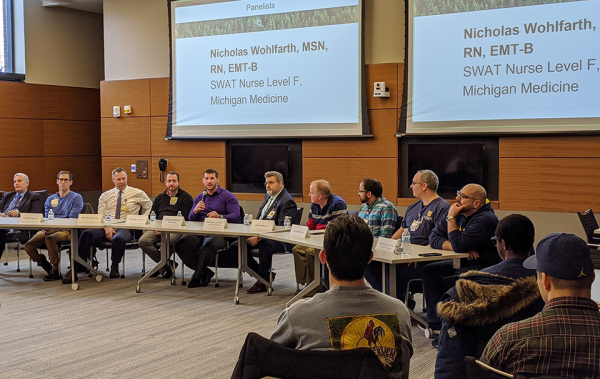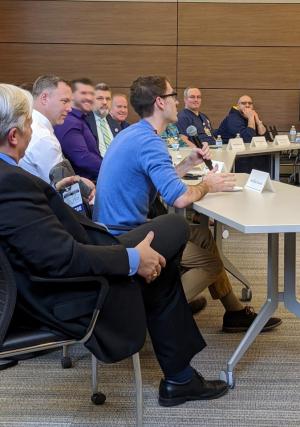U-M School of Nursing brings students and professionals together for a candid conversation on gender imbalance

Only 13 percent of nurses in the United States are men. The total number of male registered nurses is growing, but their representation in the workplace has hovered around 10 percent for the last decade, according to data from Montana State University’s Center for Interdisciplinary Health Workforce Studies.
At the University of Michigan, males compose 12 percent of the undergraduate population at the School of Nursing. While that’s slightly above the national average, the school is creating new opportunities for conversation and connection around issues that can prevent talented individuals from entering the profession.
On February 25, the U-M School of Nursing brought students and professionals together for “A Candid Conversation about Men in Nursing.” The panel discussion was developed by the school’s Office of Diversity Equity and Inclusion along with faculty members Kevin Joiner, Ph.D., APRN, ANP-BC and Margaret Calarco, Ph.D., RN, NEA-BC, to provide an informal but impactful forum for dialogue and mentorship. See for yourself and watch a video of the full discussion.
“There’s a gender dynamic in nursing that can make men feel like they don’t have an equal voice,” said Rushika Patel, Ph.D., the U-M School of Nursing’s chief inclusion officer. “I would never want someone considering a career in nursing to turn away because they don’t feel like they belong. That’s the central problem we want to address by facilitating meaningful conversations and engaging those who have chosen this path.”
Panelists represented different areas of Michigan Medicine and a broad spectrum of nursing careers, from executives to emergency nurses, educators and more:
- Rob Burke, Clinical Nursing Director
- Devin Carr, Chief Nursing Officer, University Hospital and Frankel Cardiovascular Center
- Jesus Cepero, Chief Nursing Officer, C.S. Mott Children's Hospital and Von Voigtlander Women’s Hospital
- Paul Edick, Registered Nurse and Adjunct Lecturer
- Ezio Fortuna, Registered Nurse, Pediatric Emergency Service
- Raja Issa, Nursing Supervisor and Adjunct Clinical Instructor
- David Jerkins, Nursing Supervisor
- David Lieber, Registered Nurse, Pediatric Medical-Surgical Unit
- Nick Wohlfarth, SWAT Nurse
- Rob Wonnacott, Nursing Administrative Manager
 For Joiner, who returned to college to study nursing after earning a bachelor’s degree in Spanish, his own experiences as a minority in the field have inspired him to support others navigating similar circumstances.
For Joiner, who returned to college to study nursing after earning a bachelor’s degree in Spanish, his own experiences as a minority in the field have inspired him to support others navigating similar circumstances.
“When I decided to become a nurse, it seemed like I constantly had to explain my decision,” he said. “Men who consider nursing are still pushed away because they have to explain themselves all the time. This is something we need to talk about as a profession, and I think there’s a real opportunity here to start a conversation that can continue long-term.”
Many attendees saw the event as a valuable opportunity to raise questions and concerns that aren’t always easy to vocalize.
“There are a lot of questions you have, whether they’re about the profession itself or just wondering what it’s like to be a male nurse,” said first-year student Brandon Westfall. “It’s nice to get some answers and see other perspectives I’ve never considered”
Panelists addressed a wide range of topics, with many sharing insight on how they have dealt with the social stigma that surrounds men in nursing.
“That stigma doesn’t always come from a hateful place, but often from an uninformed place,” explained Carr. “When people say ‘Oh, you’re a male nurse?’ it’s not because you’re inferior. It’s because you’re a novelty.”
Panelists also addressed the particular impact that men can have in the field and the importance of understanding the distinct value and perspectives they bring to patient care.
“There’s a special impact you can have on your patients as a male nurse,” said Lieber, who left a successful career as an architect to become one of the first male nurses hired into his unit. “Especially in pediatrics, 14- to 15-year-old boys will talk to me about these important things going on in their lives that they aren’t always comfortable sharing with female nurses.”
Self-advocacy was also a focus for the panel, as discussions highlighted the need to expand outreach and do more to position nursing as an attractive career for people from every background.
“We’re not always great at marketing ourselves,” Issa said. “Nursing is a world of unlimited opportunities — finance, informatics, patient care, ethics, psychology. How can we go outside our bubble to show what we’re capable of? Once we do that, I think more people, and more males, will come into nursing.”
At times, the conversation became personal, as some panelists recounted memorable experiences that reaffirmed their decision to become a nurse.
“Men in particular haven’t done a good job of sharing the rewards you get out of this work,” said Wonnacott, who told a heartfelt story about caring for a patient in their final moments. “If we don’t share that, we’re doing ourselves a disservice. We see so much, we impact so much, but it’s not always known.”
For men who have decided to pursue a nursing career, the event was a rare chance to hear from relatable role models and get a clearer sense of their place in the profession.
“I feel like there’s not much visibility for men in nursing. I’ve only had one experience talking to a male nurse, so I thought it would be valuable to see what’s out there and learn more about what’s possible for me in this career,” said BSN student Anon Linder.
The two-hour event was the start of what many in the audience and on the panel believe is a dynamic conversation that can continue well into the future.
“I know any of these guys will step up and say we’re here to help,” said Cepero. “Any time we can partner with the school and connect with someone who wants to shadow us or just have some one-on-one time to talk through issues, that’s what we’re here for.”





